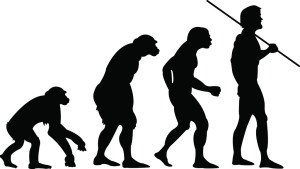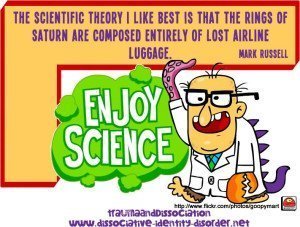People Who Reject Evolution Aren’t “Crazy”
 In today’s busy world, where we tend to rely on others to inform us about the nature of the world we live in, we receive a cloud of competing information. First eggs are good for you. The next week, science discovers eggs are bad for you. The next week, eggs in moderation are better than no eggs at all. Tomorrow, who knows? What are we to think about eating eggs? The best we can do is ride the wave of information as we proceed through our lives.
In today’s busy world, where we tend to rely on others to inform us about the nature of the world we live in, we receive a cloud of competing information. First eggs are good for you. The next week, science discovers eggs are bad for you. The next week, eggs in moderation are better than no eggs at all. Tomorrow, who knows? What are we to think about eating eggs? The best we can do is ride the wave of information as we proceed through our lives.
We can’t go through life without some basic beliefs. People need answers they can believe in. Beliefs are like landmarks that allow us to navigate the world and live our lives. Imagine if you had no real notion about whether a vehicle would stop when the brakes are applied. You probably wouldn’t drive or even take public transportation. Luckily, through your experience, observation, and training, you have learned that brakes are usually reliable, and you have the belief that under most circumstances, vehicles have the ability to stop. So strong is this belief that you are willing to risk your life every time you get in a car.
Science has provided many of the facts we use to build our beliefs. Science, like any paradigm of knowledge acquisition, is often wrong. Even so, it has provided important and relevant information. Science is useful, and combined with other factors, like our personal experience, we each create a unique and ever-changing set of beliefs that help us make sense of ourselves and the world. Science is not the only way to acquire knowledge, but it’s well suited for certain kinds of knowledge. The world would be very different without the contributions made through scientific investigation.
What happens when scientists disagree? For most people, scientific disagreements really don’t impact our lives much. We already have the core beliefs that help us make our way in the world. When a scientist claims that Heisenberg’s Uncertainty Principle is wrong, and wavelengths don’t need to be stacked in order to determine both the wavelength and location of a particle, the average person can go on living. When we have conflicting information, the average person tends to cherry-pick their beliefs—most people don’t quit their job and delve into scientific inquiry. We tend to develop beliefs based on how popular the belief is, who made the claim, and how compelling the arguments are.
When there are serious debates about important subjects, things that encroach on our core beliefs, like political issues or religious claims, things can get ugly. Passionate people tend to discount the beliefs of others, even assume others are stupid for not picking their side of the issue. Debates can get heated, and mudslinging is common. Why? Because we are all forming beliefs, and conflicting information is unwelcome.
We all want harmony and solid beliefs we can rely on. We want others to agree with us, and further solidify our belief-foundation. In the broader picture, we want belief solidifying informational progress in society for our posterity and ourselves. Lastly, we don’t want to be wrong. It’s upsetting to learn our beliefs are wrong, and it makes it more difficult to believe other things we thought we knew. It’s hard to make our way in the world if we can’t trust our own judgement, so we tend to reject people and ideas that go against our belief system.
What do we make of people who reject the Theory of Evolution? Haven’t we gotten over that yet? Don’t we all believe in evolution by now? No, not everyone does. Evolution is a popular belief, one that most scientists believe in. It’s still a “theory” but the way it’s presented seems to make sense. If it’s so popular, and most scientists agree with it, why can’t we all just get on board already? Not so fast. Forming a belief system requires more than popularity. Unilaterally popular beliefs, even in science, have been wrong in the past. Imagine if everyone chose their beliefs based on popularity! Without some people who are willing to challenge popular beliefs, mankind would probably be extinct today, and if we did manage to survive, we wouldn’t have made much progress.
 Each person requires a different standard of proof before forming a belief. For many people, a theory simply isn’t good enough, no matter how popular it is. Despite the fact that a scientific “theory” and a layperson’s “theory” are assigned different meanings, a theory, nonetheless, is something that is not concrete. For others, competing forms of knowledge, like religious knowledge, conflict with the theory and they choose a different paradigm of knowledge. Some scientific experts have found the theory lacks the credibility most people assign to it. There are many different reasons why people choose to reject the Theory of Evolution, and it’s not enough to say such people are crazy. Many are well-educated, thoughtful, and even members of the scientific community.
Each person requires a different standard of proof before forming a belief. For many people, a theory simply isn’t good enough, no matter how popular it is. Despite the fact that a scientific “theory” and a layperson’s “theory” are assigned different meanings, a theory, nonetheless, is something that is not concrete. For others, competing forms of knowledge, like religious knowledge, conflict with the theory and they choose a different paradigm of knowledge. Some scientific experts have found the theory lacks the credibility most people assign to it. There are many different reasons why people choose to reject the Theory of Evolution, and it’s not enough to say such people are crazy. Many are well-educated, thoughtful, and even members of the scientific community.
Evolution makes sense on the surface, but is widely misunderstood. So too are those who reject evolution. When someone objects to evolution, it’s often assumed that they reject all parts of the theory, and some parts of evolutionism seem so obvious that it’s easy to discount such people as nutty idiots. Moreover, many people imagine that evolutionary disbelief brings with it a rejection of the Big Bang. Why? I don’t know–these are two separate theories. Many people jump to all kinds of assumptions when they learn that someone questions evolution. Evolutionary objectors are easy to straw man–they make juicy targets, and it’s common to conflate evolution objectors to the simplest terms, lumping them together, unilaterally discounting them. This is because there are at least some parts of evolution theory that we all tend to believe in strongly—we won’t genuinely entertain we are wrong on such a profound level. People who reject evolution are no less complex than those who believe strongly in evolution. Like those who believe in evolution, objectors have their reasons—reasons that meet the standard of proof required to solidify their belief system. Conflating objectors to the simplest terms, labeling them “crazy” for not forming the same belief about a theory, is, charitably, a character flaw.
Most objectors to evolutionary theory don’t discount the entire theory. Many would not argue that longer necked giraffes would be more likely to survive a sudden lack of low-lying brush, and would pass the trait of longer necks to their offspring. Objectors are unlikely to deny that selectively breeding grey pigeons will result in varied types of pigeons. These facts, and others, are undeniable. When someone objects to evolution, it’s easy to imagine that he/she is deeply mistaken about some obvious facts. Maybe not. Objectors to evolution usually object to the theory in its entirety because some parts of the theory are less credible. It’s an all or nothing prospect when speaking in broad terms. Even though evolutionary theory doesn’t actually claim to account for why life exists at all, it’s widely misunderstood to account for life in general. Sometimes, people misunderstand that some evolutionary objectors are rejecting wider misconceptions, or specific points of the theory that they believe to be defective.
Society tends to separate creationists and evolutionists into two camps. Creationists believe life was created by God, and animals exist as God made them, programmed in an orderly way with the profoundly complex language of DNA, which allows for adaptation, but doesn’t account for new species development. They don’t deny adaptation, but without real evidence, they reject the notion that rabbits, through genetic mutation or breeding, will eventually become elephants, or vice-versa. Evolutionists don’t make scientific claims about why life exists, except in conjecture, but believe that however life managed to arrive, adaptation and genetic mutation have resulted in every living thing, beginning with low levels of complexity, giving rise to higher levels of complexity. Evolutionists fill in the gaps with storytelling, and suppose that given enough time, entirely new species are created through natural processes we have not yet witnessed, but which seem to fit with certain fossil evidence, DNA testing across species, and oddities like vestigial organs and so forth. They deny any intelligent order in the mega-complex programming DNA delivers; and although new species creation is something never witnessed, the theory seems to fit well enough to make it worth believing in.
There are flaws in evolutionary theory, easily discovered with basic research, and beyond the scope of this short article. That said, the theory is compelling in a vacuum of competing knowledge. It’s a popular theory, and despite it being merely a “theory,” many mistakenly believe it to be “scientific fact.” This mistake is understandable, especially in today’s busy world. For some people, how popular a theory is bolsters its credibility, satisfying the measure of proof some laypeople need before believing something has crossed the threshold from theory to fact. Who it is that claims a theory can make a big difference too. If someone wears a lab coat, suddenly what they say seems more credible to certain people. It’s really no wonder people defend evolution, even those who don’t fully understand it.
For those who reject evolutionary theory, a more appropriate response is to understand why. Everyone has beliefs, and different standards by which worldviews are supported. Evolutionary objectors are far more complex than many give them credit for, and while conflating them to the lowest denominator seems like a popular response, making it much easier to dehumanize them, attack them, and discount their beliefs altogether, calling evolutionary objectors “crazy” is a personal character flaw. Evolution is a complex issue, and the reasons for supporting or rejecting the theory are no less complex. Science is well suited to answer some questions, but ill-suited to answer others. While the Theory of Evolution seems to fill in the gaps, fitting some of the questions science poses about the world and its history, people who object simply require more proof by science before conceding their beliefs which may have foundations both in science and in other paradigms of knowledge.
